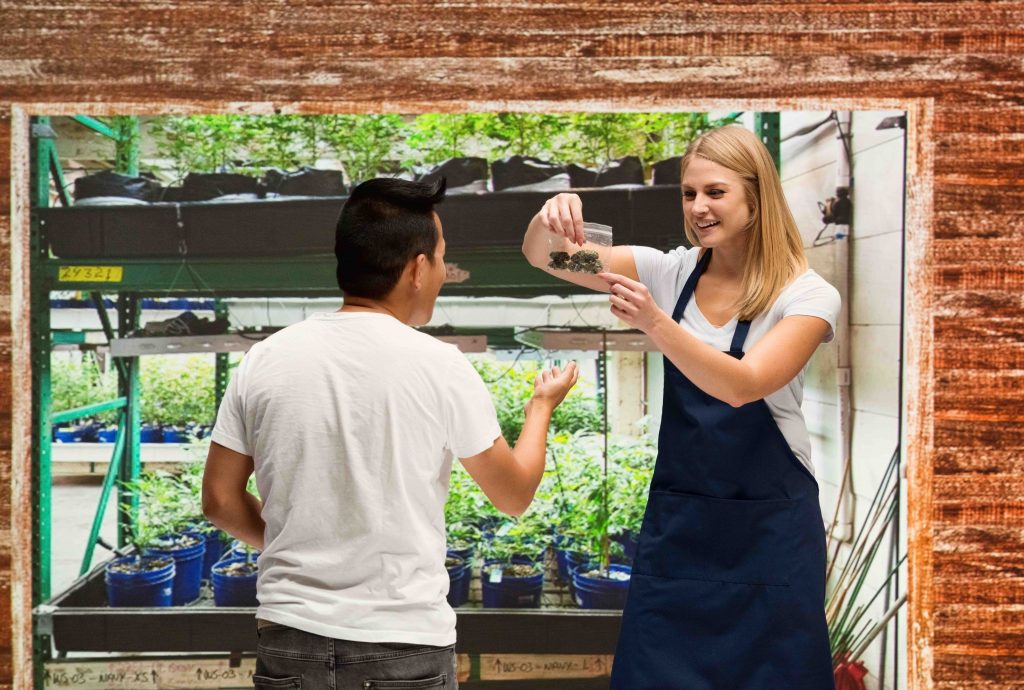
Features
Opinion
Legal
Business
Opinion
Editorial: Cannabis consumer education leaves so much to be desired
Knowledge is power
August 6, 2019 By Mari-Len De Guzman
 Customer buying marijuana. (Credit: Getty Images)
Customer buying marijuana. (Credit: Getty Images) I made my first legal cannabis purchase recently. My friends and I just finished having dinner and we decided to walk to a nearby coffee shop when I saw a line-up of people wanting to get into what looked like a very inconspicuous establishment. I would not have given it a thought if it were not for the people standing outside waiting to get in, and my natural curiosity got the best of me. I looked up and saw the Tokyo Smoke sign.
Since the Ontario Cannabis Store opened online, I’ve been tinkering around that site intending to make a purchase but I always end up with an empty basket. As someone with very little experience with cannabis consumption, I need a lot of education on this front. But there isn’t a lot of information on the OCS that would help me in the buying process. It seems the online store was made for consumers with a fairly adequate knowledge of strains and brands –who already know what they want to purchase – but not for people who are just exploring these products now that it’s legal.
So I stepped inside the Tokyo Smoke store on Yonge Street in Toronto, expecting the human budtenders would be able to enlighten me in a way that the impersonal online store was never able to. And so about 40 minutes and $19 later, I came out with a small package containing a gram of pre-rolled joint – albeit as unenlightened as the time I entered the store.
Thanks to Health Canada regulations, the knowledgeable budtenders are very cautious about what they can and can’t say to a potential customer. And it’s doing a disservice to the consumers.
The federal government has earmarked $100 million over the next six years to fund public education and awareness on the health effects and the risks associated with cannabis use. For such a huge investment, there is not a lot of education going on at the point of sale, where the people who are or potentially will be using cannabis actually are. Budtenders can talk about the plant, the strains, THC and CBD content, maybe recommend dosage. What they can’t talk about is anything that has to do with consumer experience, particularly about the therapeutic benefits of cannabis.
The Ontario government has announced it will issue 50 new licences for cannabis retail outlets. With a very restrictive regulation pertaining to what information legal cannabis sellers can provide through their product packaging or at the retail stores, the government is failing to capitalize on perhaps the most effective resource they have for public education: the budtenders.
In Ontario, sales of legal cannabis rose significantly after the first few licensed cannabis retail stores opened in April. People seem to want to interact with a physical store and engage the knowledgeable budtenders when purchasing cannabis – especially for the first time.
Of course, making unsubstantiated health claims about a product should be illegal. Consumers who are exploring how cannabis can help with their health and wellness must do their own homework about what evidence exists around the benefits of cannabis – but they are not always as savvy.
The scientific literature is limited currently but the research is increasing. In as much as Health Canada is funding programs that promote public awareness about the health and safety risks associated with cannabis use, resources must also be allocated, not only in building the evidence, but finding ways to bring those evidence information to the public. People are increasingly taking charge of their own health and wellness, the cannabis industry and the government can only benefit from a well-educated, well-informed consumer population.
Print this page